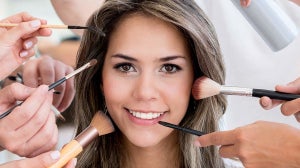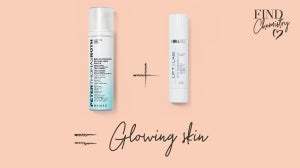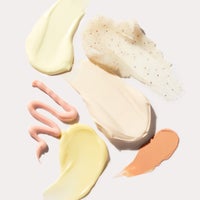
At SkinStore we’ve asked AI to predict the impact of not using dermatologist advised products.
Using specific prompts, we asked an AI generator to create imagery predicting the impact of not using the following skincare products,
- SPF
- Cleansers
- Retinol
- Vitamin C
We’ve then worked with skincare experts to comment on the reality of these images and just how accurate they are to determine the skincare steps we should never skip.
What Would Skin Look Like Without Daily SPF Use for 30 Years?
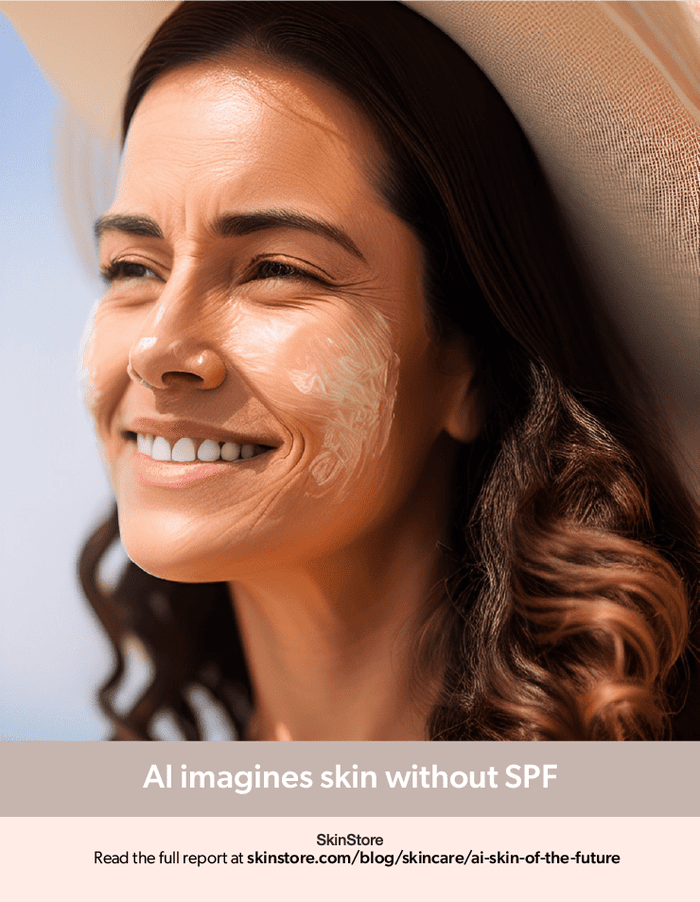
Commonly associated with warmer climates and vacations, SPF is often underestimated in terms of its importance within our day-to-day skincare routines, however, it is a crucial step that should never be overlooked. UV rays are present all year round, even on colder, cloudy days. With 28% of Americans saying they never apply SPF to their face, we asked AI what skin looked like without daily SPF use for 30 years. It predicted wrinkles and fine lines around the forehead and eyes, which is the most common indication of sun damage and lack of SPF use. Sun damage wrinkles are caused by the penetration of UV rays, causing the elastin fibers in the face to break down and create fine lines and premature aging.
AI has also imagined dry, flaky skin to form around the cheeks causing an uneven skin tone. This is the most immediate effect of sun damage and the lack of SPF use, as UV rays damage the outer layer of your facial skin known as the stratum corneum. This will cause your skin to become dehydrated and damaged, which is correctly shown in AI’s prediction of no SPF use.
When should I apply SPF?
To avoid the damage imagined by AI, When you are exposed to strong UV rays, you should apply SPF every two hours. This will keep your skin cells protected and limit penetration from UV rays. Getting into a habit of applying sunscreen daily as part of your skincare routine is a great way to stay on top of your SPF use and keep your skin healthy and protected. SkinStore recommends shopping for SPFs that offer both UVA/UVB protection. UVA has a longer wavelength and is associated with skin aging. UVB has a shorter wavelength and causes skin burning.
SkinStore’s tip: Use weather apps to monitor UV rays in your area, between 0-2 means sun damage is minimal, and applying SPF once in the morning will be fine. However any UV index above three means you must re-apply sunscreen every 2 hours to protect yourself from the sun.
SkinStore’s pick: EltaMD UV Clear Broad-Spectrum SPF46 $41
What Would Skin Look Like Without Using Retinols for 60 Years?
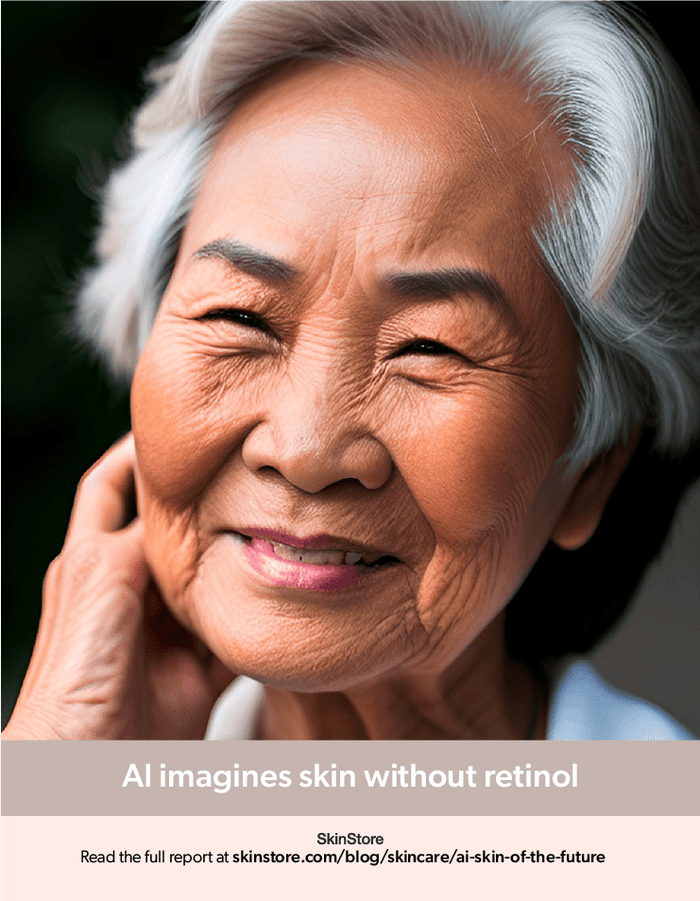
In this image, AI has predicted the impacts of not using Retinol products throughout your lifetime. AI has imagined wrinkles and fine lines across the face, with deeper wrinkles around the eyes and chin area. While there aren’t any products that completely prevent the natural process of aging, could wrinkles imagined by AI be reduced by the use of retinoids?
What makes retinol such a great ingredient? The Ordinary Lab states that “retinol has been used within the industry for years and has become a trusted ingredient for many as it has been clinically proven to provide multiple skin benefits. This potent ingredient is highly effective in targeting the appearance of textural irregularities, signs of aging, and also it works to support important structural components of the skin and its natural exfoliating mechanisms.’’
But be aware of the difference between retinol and retinoids, as retinol is accessible over the counter and available to those who want to introduce them into their skincare routine. While most retinoids are only available through prescription medication. It’s great to introduce retinol into your skin routine in your mid-twenties as this is when collagen production slows down. With persistent and careful use of retinol, you will find that your skin feels plump and the appearance of fine lines and wrinkles will be minimized. This can be a great way to slow down the aging process of your skin in a much less invasive way to cosmetic procedures and treatments such as botox - this doesn’t mean they are an essential skincare product, but more of a preference. We don’t need to be ashamed of our skin changing as we grow older, however, retinoids are an effective way to look after your skin long term.How to use retinol
Before you decide to introduce retinol into your skincare routine, you must ensure you are using the correct strength for your skin type. If you have skin conditions such as rosacea or eczema, retinol can irritate your skin and cause damage. For less sensitive skin types, SkinStore recommends starting with retinol which has a low concentration of around 0.5%.
Many retinol products advise using the product daily, but overdosing on retinol can cause your skin to peel and become flaky. Instead, use your retinol product 2-3 times a week at night.
SkinStore’s retinol tip: When first trying retinol, use it for three months to maximize skin cell production. Have a break after three months as research shows that skin cell production stops after three months of retinol use.
SkinStores pick: The Ordinary Retinol Serum 1% in Squalane $8.30
What Does Skin Look Like Without Vitamin C for 30 Years?
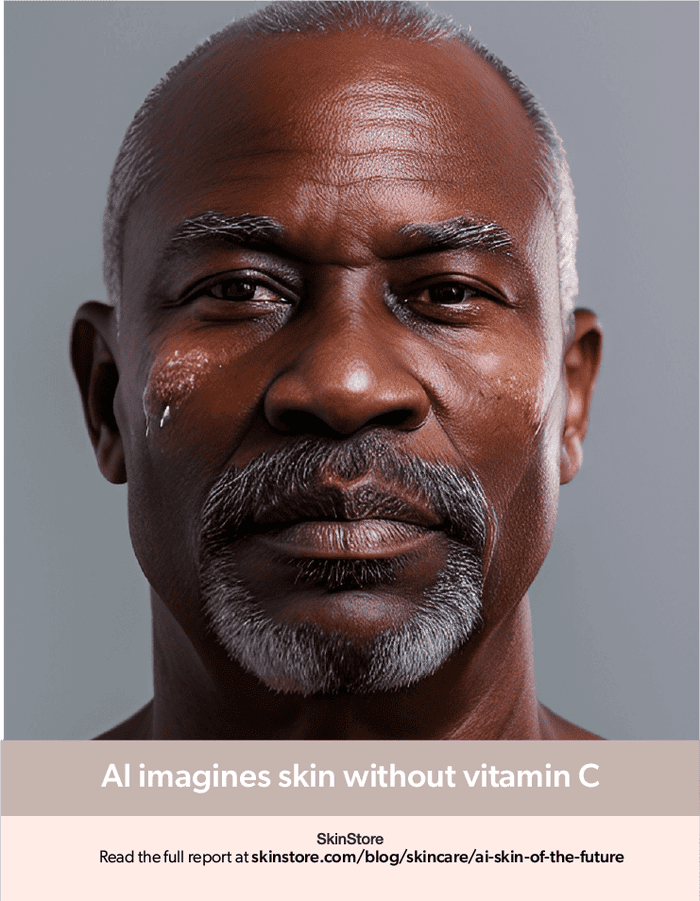
Vitamin C deficiencies affect 1 in 20 people so we wanted to ask AI to imagine the impacts of not using vitamin C products consistently, AI shows a clear indication of uneven skin tone, texture, and pigmentation around the cheeks as well as fine lines across the forehead which can occur when the skin is deficient in vitamin C.
As depicted in AI’s prediction, pigmentation and uneven texture around your face can cause clogged pores and goose bump-like clusters on your cheeks.
Why should I apply Vitamin C?
Skincare products that are rich in vitamin C should be an essential part of your skincare routines, whilst helping conditions such as pigmentation they are also a great combination vitamin for reducing dark spots, acne and can also help treat sun-damaged skin.
How to use Vitamin C in skincare?
Depending on your skin type, vitamin C products can be used to target different imperfections, but for the best results, SkinStore recommends using a vitamin C product that contains a high acidic value.
SkinStore’s Vitamin C tip: It is recommended that you apply a vitamin C serum once or twice a day following cleansing and toning. You should then follow with a moisturizer. Vitamin C can be safely used with other active ingredients but not alongside retinol, apply your vitamin C in the morning and your retinol as part of your evening routine. Using it alongside products containing niacinamide may also make it less effective.
SkinStores Pick:SkinCeuticals C E Ferulic with 15% L-Ascorbic Acid Vitamin C Serum $182
What Does Skin Look Like Without Using Cleansers For 30 Years?
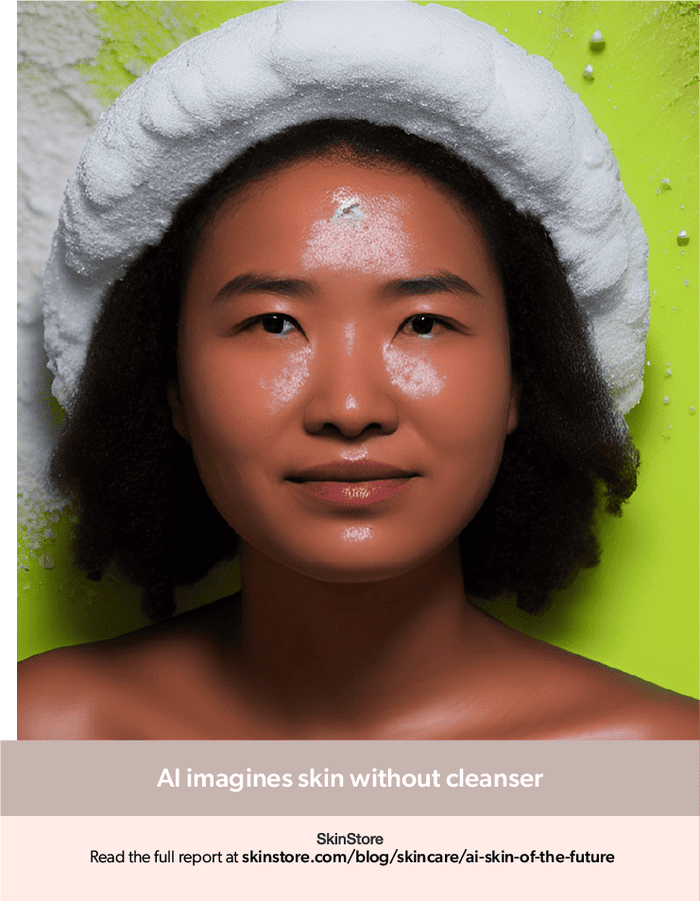
When asked to predict the impact of not using cleansers on your face, AI has imagined a build-up of sebum and oil across your T- zone and chin area notably where the face has the most pores. Despite being a prediction, AI has envisioned the realistic impacts of not using cleansers as part of your skincare routine. CeraVe’s study revealed that 48% of Americans don’t use cleanser on their face despite it being one of the most important steps of a skincare routine.
Elemis expert Emer Gillen says “48% of Americans say they don’t use a cleanser on their face despite it being one of the most important steps of a skincare routine. There are so many cleansers on the market that have different properties tailored for various skin types. Cleansers primarily remove makeup, but also the normal accumulation of dirt and oils, sunscreen, pollutants, as well as dead skin cells. As an authority on cleansers, Elemis has a library of cleansing textures. Cleansing Balm is our #1 cleanser, selling 1 jar every 13 seconds globally.’’
How to cleanse your face properly
While cleansing your face daily is important, you must avoid over-cleansing your face. This can reduce the face’s natural oils and destroy your skin barrier. This will allow more bacteria to enter your face and cause breakouts and irritation.
The best time to cleanse your face is as part of your evening skincare routine, reducing the amount you cleanse to once a day will ensure you're not stripping your face of natural oils and helps remove any dirt from the day.
SkinStore’s tip: Invest in two cleansers, one gentle product for daily use, and a cleansing balm to remove heavier makeup instead of cleansing wipes. Cleansers are gentle and a safer alternative to removing your makeup that is also much more environmentally friendly.
SkinStores pick:Elemis Pro-Collagen Cleansing Balm $68 & iS Clinical Cleansing Complex $45
The Impact of Social Factors on Skin
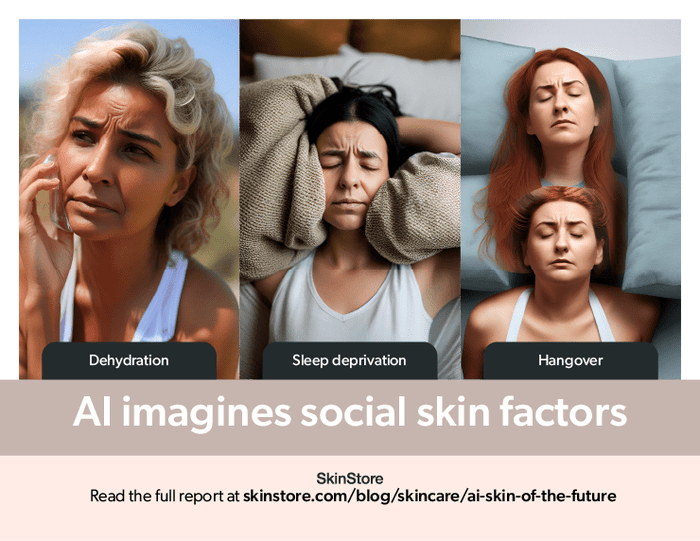
We used AI to imagine the impacts of not using certain products, but how did AI imagine the impact of social factors?
We looked at common social factors known to cause skin problems such as dehydration, sleep deprivation, and alcohol use.
How Do Social Factors Impact Our Skin?
Dr.Sigrun Dogg Gudjonsdottir, Chief of Research & Development at Bioeffects says ‘’Social factors can have a huge impact on the health of our skin, while we recommend investing time and effort into our skincare routines, how we take care of our bodies in terms of lifestyle is also important. Ensuring we get enough sleep, drink enough water, and fuel our bodies with healthy nutritious food is crucial not only for general wellbeing, but also for maintaining healthy, clear skin.”
Dehydration
AI has imagined a realistic representation of dehydrated skin, with wrinkles present across the forehead and dry patches around the face and eyes.
Whether you have oily, combination, or dry skin texture, it’s easy for your skin to become dehydrated due to lifestyle factors. This can occur from lack of hydration through water, or the climate you live in, making it important that you’re not only using the correct skincare products for your skin type but also taking these factors into account too.
SkinStores tip: If you notice your skin is dehydrated, the best option is to increase your water intake, drinking up to 60 to 80 ounces of water a day will keep your skin moisturized and elasticated. But ensure you also have a strong moisturizer rich in hyaluronic acid, this acid keeps your skin hydrated by locking in moisture.
SkinStores pick:BIOEFFECT Hydrating Cream $79
Sleep Deprivation
Lack of sleep can have a huge impact on your skin, as demonstrated by AI sleep deprivation raises your cortisol levels, triggering your skin to become inflamed, puffy, and prone to breakouts and sensitive skin.
Beauty brand DHC says ‘’Our beauty tip: 8 hours of sleep and Extra Nighttime Moisture. Having the right amount of sleep works wonders for your mental and physical health as well as keeping your skin healthy-looking. As part of your nightly routine, apply Extra Nighttime Moisture evenly over your face and let it work its magic during the night. Loaded with botanicals and hydrating heroes like olive oil, squalane, and vitamin E, it helps replenish moisture in your skin while you get your beauty rest’’
SkinStores tip: Before you go to sleep, try slugging your face with a heavy moisturizer or night cream. Slugging involves covering your face in a thick layer of product to help reinforce protective barriers around the face. This will keep your skin hydrated and plump, so even after those sleepless nights, your skin will stay healthy.
SkinStore’s pick:DHC Extra Night Time Moisture Cream $39
Hangover
When you drink alcohol, your vasopressin hormone becomes suppressed causing your body to become dehydrated, which in term affects your skin's hydration. Causing puffiness and breakouts across the face. When AI was asked to imagine the impacts on ‘hungover skin’, you can see visible inflammation and fine lines around the eyebrows.
While fine lines are not an immediate impact of alcohol use, drinking alcohol can break down elastic fibers in your skin which may contribute to premature fine lines in the future. But alcohol also increases the risk of sleep deprivation, which can lead to dark circles around your eyes and puffiness.
SkinStore tip: Before you drink alcohol it’s important you are hydrated, and when waking up after a night of drinking ensure you are using a strong moisturizer and face or eye mask to keep your skin clean and hydrated
SkinStore pick:Peter Thomas Roth Water Drench Hyaluronic Cloud Hydra-Gel Eye Patches $55
Methodology
AI imagery for this campaign was created using https://dream.ai/create. We used specific prompts to create images based fully on AI’s perception of not using certain skincare products. For example “30-year-old woman’s skin that does not wear SPF daily’. This then created images based purely on AI’s predictions, which we were then able to comment on with expert-backed insights.
Sources
29% of Americans say they never use SPF on their faceVitamin C deficiency affects 1 in 20 people48% of Americans don't use cleansers25,000 skincare products on the market
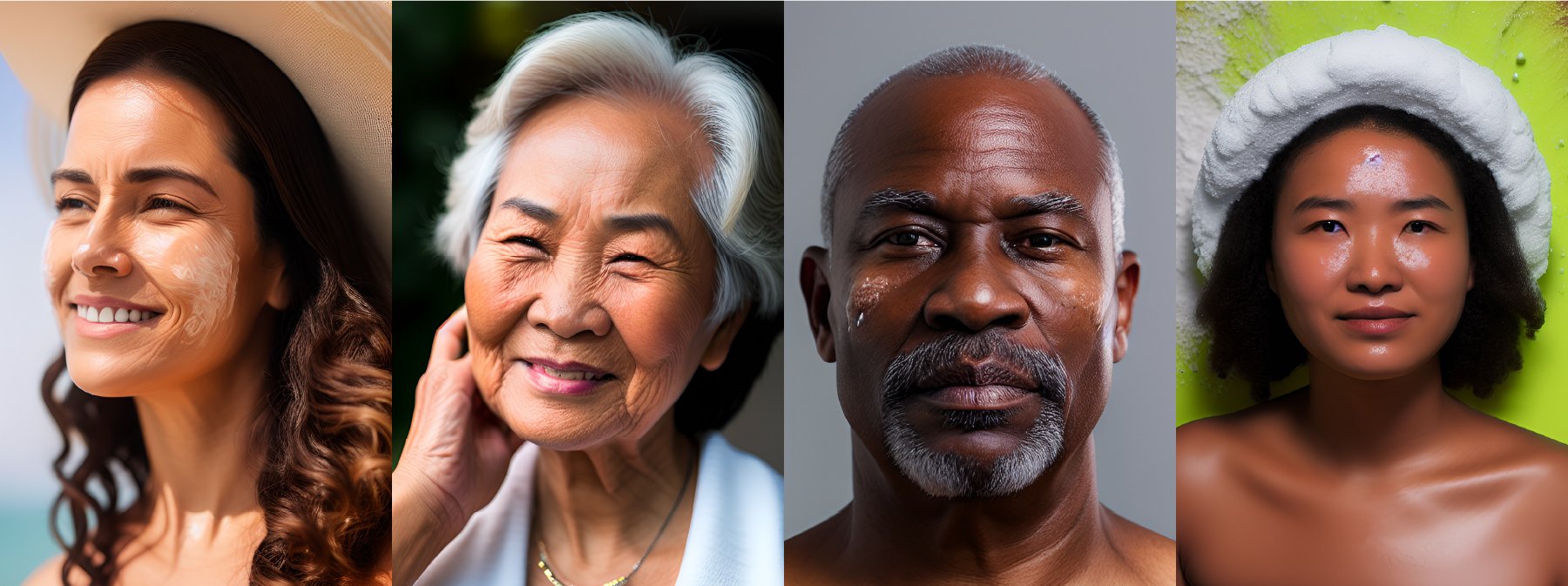


![Phytomer CC Creme Skin Perfecting Cream SPF 20 [GIVEAWAY]](https://static.thcdn.com/images/xsmall/original/wp-content/uploads/sites/36/2016/04/12103417/1200x672-lf-wk13-cg-blog-hero-skinstore-11.jpg)

